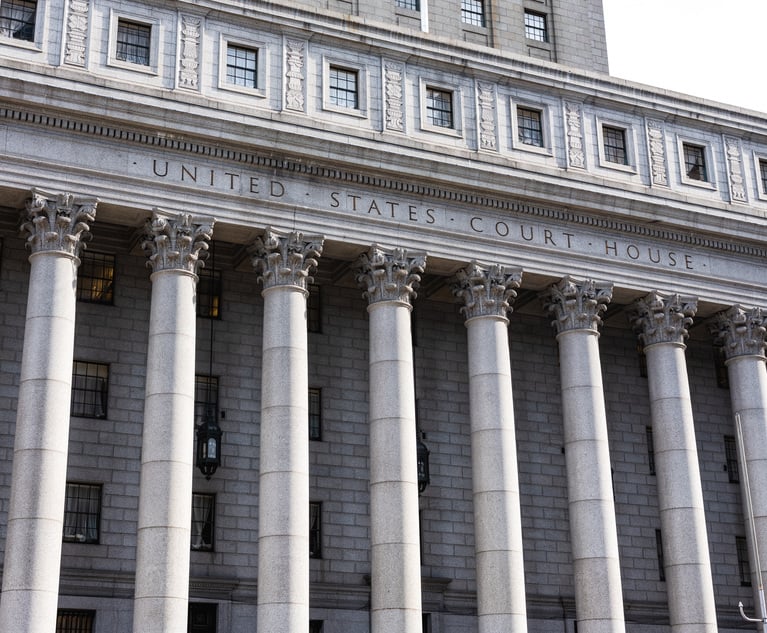 Robert J. Anello and Richard F. Albert
Robert J. Anello and Richard F. Albert FIFA Decision Confirms Long Arm of Honest Services Fraud
In their White-Collar Crime column, Robert J. Anello and Richard F. Albert discuss the Second Circuit's decision in 'Napout,' which illustrates that if investigators find use of the U.S. banking system in carrying out a scheme, few practical limits will be placed on U.S. prosecutors' ability to reach alleged misconduct anywhere in the world.
August 12, 2020 at 02:15 PM
12 minute read
The U.S. government's lead role in the prosecution of corruption within the Zurich, Switzerland-based Fédération Internationale de Football Association ("FIFA") may be a paradigmatic example of U.S. law enforcement acting as the world's policeman, reaching out around the globe to prosecute wrongdoing with little apparent connection to the land of baseball, hot dogs and apple pie. Didn't the Supreme Court remind everyone just a few years ago that U.S. statutes are presumed only to apply domestically? If corruption is based on foreign executives violating their duties of loyalty to foreign private entities, how does that translate into a violation of U.S. criminal law? Does it matter that the conduct in which the foreign executive engaged—commercial bribery—may not be illegal under the law of the executive's home country?
The Second Circuit answers these questions in its recent decision in United States v. Napout, 963 F.3d 163 (2d Cir. 2020), affirming the convictions of Juan Angel Napout, the former president of Paraguay's national soccer federation, and Jose Maria Marin, the former head of the Brazilian national soccer federation. In doing so, the decision joins a long line of authority illustrating that as long as the scheme entails some use of the U.S. banking system, the Department of Justice can venture broadly indeed to prosecute foreign nationals under U.S. criminal law for conduct that appears predominantly foreign in locus and effect, with little regard for whether that conduct would violate the criminal laws of their home country.
This content has been archived. It is available through our partners, LexisNexis® and Bloomberg Law.
To view this content, please continue to their sites.
Not a Lexis Subscriber?
Subscribe Now
Not a Bloomberg Law Subscriber?
Subscribe Now
NOT FOR REPRINT
© 2025 ALM Global, LLC, All Rights Reserved. Request academic re-use from www.copyright.com. All other uses, submit a request to [email protected]. For more information visit Asset & Logo Licensing.
You Might Like
View All
Decision of the Day: Qui Tam Relators Do Not Plausibly Claim Firm Avoided Tax Obligations Through Visa Applications, Circuit Finds

'Serious Legal Errors'?: Rival League May Appeal Following Dismissal of Soccer Antitrust Case
6 minute read
Decision of the Day: Judge Sanctions Attorney for 'Frivolously' Claiming All Nine Personal Injury Categories in Motor Vehicle Case

Law Firms Mentioned
Trending Stories
- 1'A Waste of Your Time': Practice Tips From Judges in the Oakland Federal Courthouse
- 2Judge Extends Tom Girardi's Time in Prison Medical Facility to Feb. 20
- 3Supreme Court Denies Trump's Request to Pause Pending Environmental Cases
- 4‘Blitzkrieg of Lawlessness’: Environmental Lawyers Decry EPA Spending Freeze
- 5Litera Acquires Workflow Management Provider Peppermint Technology
Who Got The Work
J. Brugh Lower of Gibbons has entered an appearance for industrial equipment supplier Devco Corporation in a pending trademark infringement lawsuit. The suit, accusing the defendant of selling knock-off Graco products, was filed Dec. 18 in New Jersey District Court by Rivkin Radler on behalf of Graco Inc. and Graco Minnesota. The case, assigned to U.S. District Judge Zahid N. Quraishi, is 3:24-cv-11294, Graco Inc. et al v. Devco Corporation.
Who Got The Work
Rebecca Maller-Stein and Kent A. Yalowitz of Arnold & Porter Kaye Scholer have entered their appearances for Hanaco Venture Capital and its executives, Lior Prosor and David Frankel, in a pending securities lawsuit. The action, filed on Dec. 24 in New York Southern District Court by Zell, Aron & Co. on behalf of Goldeneye Advisors, accuses the defendants of negligently and fraudulently managing the plaintiff's $1 million investment. The case, assigned to U.S. District Judge Vernon S. Broderick, is 1:24-cv-09918, Goldeneye Advisors, LLC v. Hanaco Venture Capital, Ltd. et al.
Who Got The Work
Attorneys from A&O Shearman has stepped in as defense counsel for Toronto-Dominion Bank and other defendants in a pending securities class action. The suit, filed Dec. 11 in New York Southern District Court by Bleichmar Fonti & Auld, accuses the defendants of concealing the bank's 'pervasive' deficiencies in regards to its compliance with the Bank Secrecy Act and the quality of its anti-money laundering controls. The case, assigned to U.S. District Judge Arun Subramanian, is 1:24-cv-09445, Gonzalez v. The Toronto-Dominion Bank et al.
Who Got The Work
Crown Castle International, a Pennsylvania company providing shared communications infrastructure, has turned to Luke D. Wolf of Gordon Rees Scully Mansukhani to fend off a pending breach-of-contract lawsuit. The court action, filed Nov. 25 in Michigan Eastern District Court by Hooper Hathaway PC on behalf of The Town Residences LLC, accuses Crown Castle of failing to transfer approximately $30,000 in utility payments from T-Mobile in breach of a roof-top lease and assignment agreement. The case, assigned to U.S. District Judge Susan K. Declercq, is 2:24-cv-13131, The Town Residences LLC v. T-Mobile US, Inc. et al.
Who Got The Work
Wilfred P. Coronato and Daniel M. Schwartz of McCarter & English have stepped in as defense counsel to Electrolux Home Products Inc. in a pending product liability lawsuit. The court action, filed Nov. 26 in New York Eastern District Court by Poulos Lopiccolo PC and Nagel Rice LLP on behalf of David Stern, alleges that the defendant's refrigerators’ drawers and shelving repeatedly break and fall apart within months after purchase. The case, assigned to U.S. District Judge Joan M. Azrack, is 2:24-cv-08204, Stern v. Electrolux Home Products, Inc.
Featured Firms
Law Offices of Gary Martin Hays & Associates, P.C.
(470) 294-1674
Law Offices of Mark E. Salomone
(857) 444-6468
Smith & Hassler
(713) 739-1250






